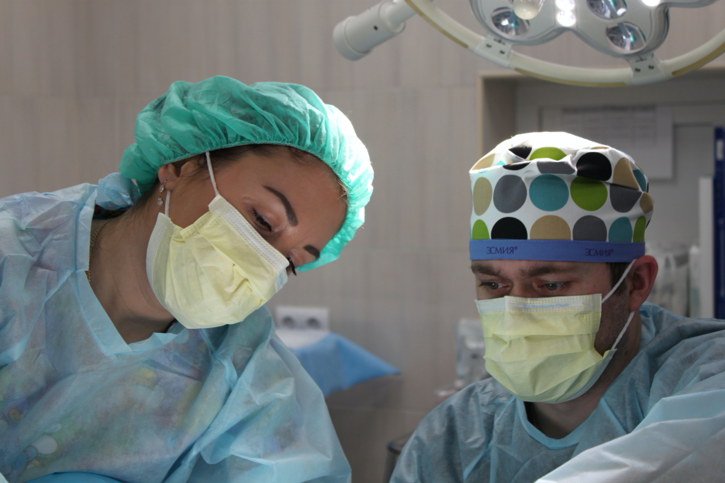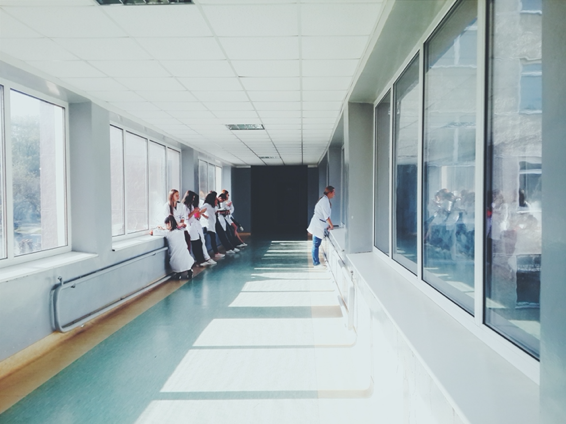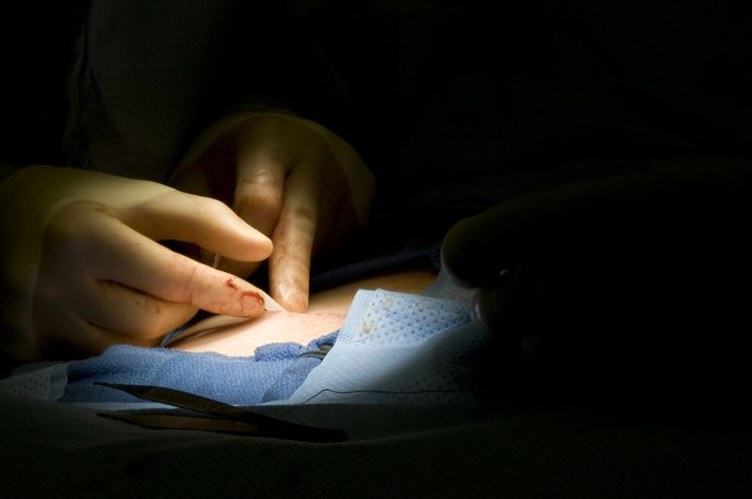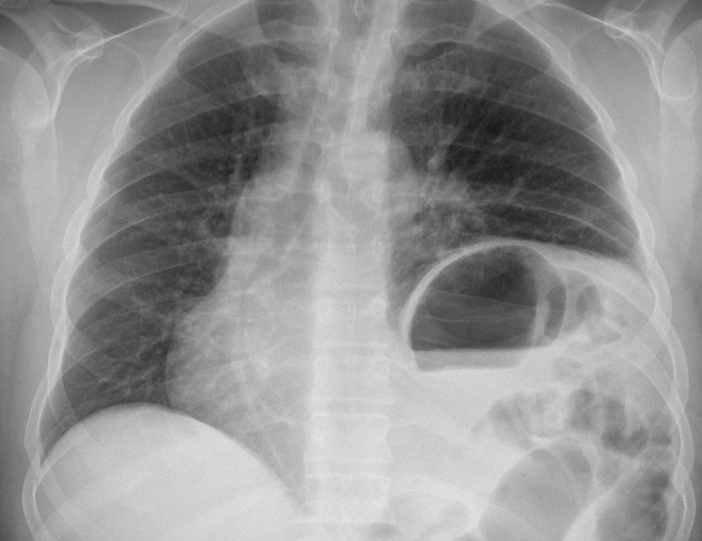CALL TODAY 646-846-1136 | EMAIL
Surgical Experts Dedicated to Improving Lives
At Lenox Hill Minimally Invasive Surgery PLLC, Dr. Valery Dronsky and his staff of medical professionals provide compassionate care with the highest ethical & professional standards. In our state of the art facility, we offer surgical services using only the most cutting edge and current procedures and treatments. We specialize in general surgery, including extensive experience in performing hernia repair surgery. Our expertise is in minimally invasive surgery and robotic surgery. Minimally invasive and robotic surgery often allow patients to experience easier recovery than traditional open surgery. They also allow for more precise and less traumatic surgery. When robotic and minimally invasive surgery is not an option, we are also skilled and experienced in traditional open surgical procedures.
Dr. Dronsky is an experienced and highly skilled surgeon having undergone extensive training in school, residency and fellowships. He practices medicine with ethical behavior, compassion and superb bedside manner. In the operating room he exhibits precision mechanical abilities, analytical thinking and the ability to visualize tissue in three dimensions. These innate and learned skills allow Dr. Dronsky to be one of the most dexterous and skilled professionals in New York City and the Country.
Call us: 646-846-1136
PATIENT TESTIMONIALS
Recent Awards
We are honored and deeply appreciative to have consistently received prestigious awards and recognition year after year, establishing us as one of New York’s foremost hospitals for a wide range of general surgeries, safety measures, specialized procedures, and overall excellence in healthcare. At Lenox Hill Minimally Invasive Surgery, our unwavering commitment lies in delivering exceptional care and unwavering support to our patients, guaranteeing their safety and successful recovery throughout their entire surgical experience.
Hospital Quality Awards
 America’s 50 Best Hospitals Award™ (2023, 2022)
America’s 50 Best Hospitals Award™ (2023, 2022)
Top 1% in the nation for providing the highest clinical quality year over year.

America’s 100 Best Hospitals Award™ (2021)
Top 2% in the nation for consistently delivering clinical quality year over year.

America’s 250 Best Hospitals Award™ (2023, 2022, 2021)
Top 5% in the nation for consistently delivering clinical quality.

Patient Safety Excellence Award™ (2023, 2022)
Top in the nation for providing excellence in patient safety by preventing infections, medical errors, and other preventable complications.
Specialty Clinical Quality Awards

America’s 100 Best Hospitals for Cardiac Care Award™ (2023, 2022, 2021, 2020, 2019)
Superior clinical outcomes in heart bypass surgery, coronary interventional procedures, heart attack treatment, heart failure treatment, and heart valve surgery.

America’s 100 Best Hospitals for Coronary Intervention Award™ (2023, 2022, 2021, 2020, 2019)
Superior clinical outcomes in coronary intervention procedures (angioplasty with stent).

America’s 100 Best Hospitals for Prostate Surgery Award™ (2023, 2022, 2021)
Superior clinical outcomes in prostate removal surgery and transurethral resection of the prostate.
Click to see all of our Healthgrades best doctors awards
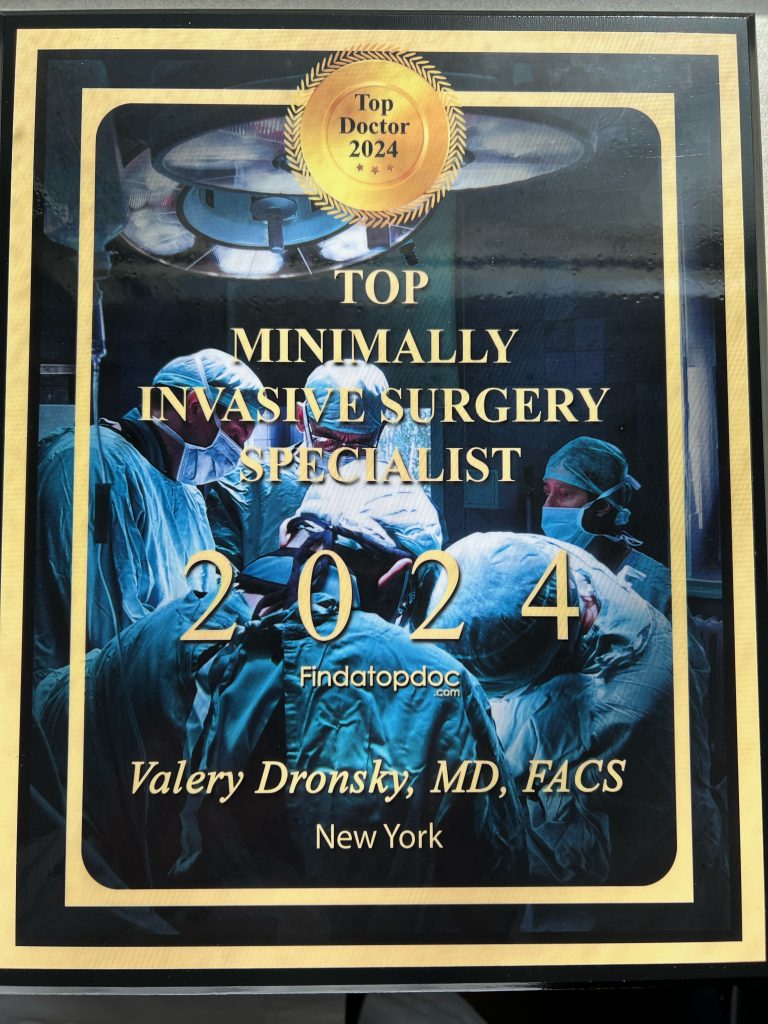
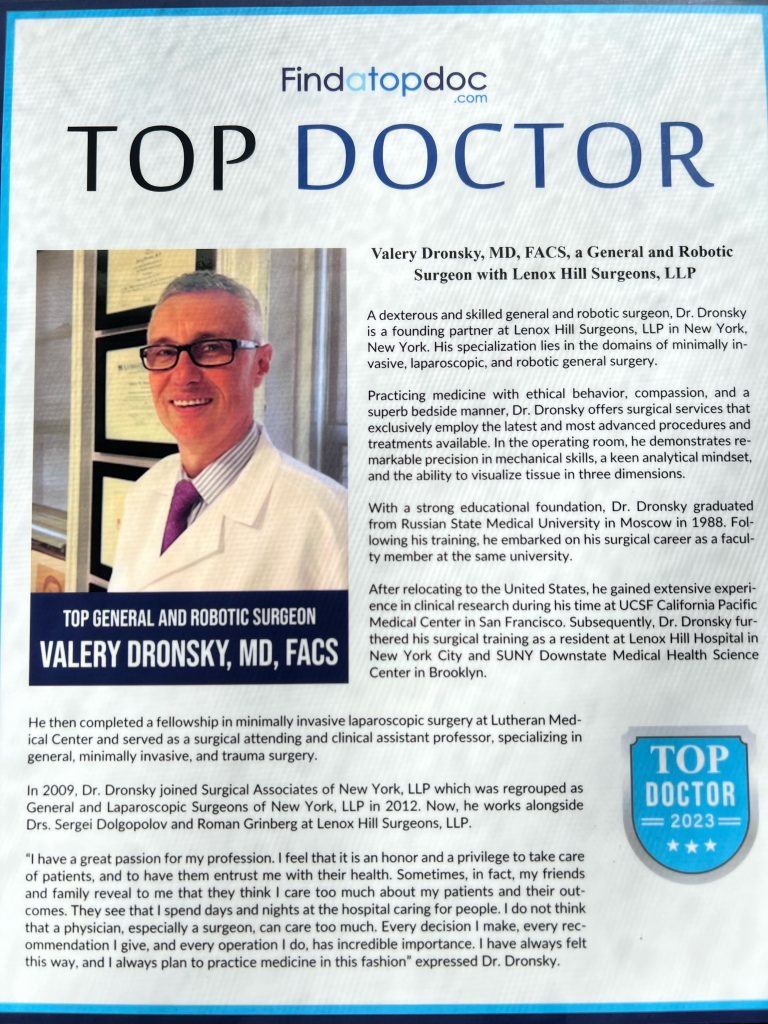


Visit our main website at www.LenoxHillMinimallyInvasiveSurgery.com
Blog Posts are Below:
Monthly Archives: December 2020
All About Hernias
Many people classify Hernias into different kinds, Inguinal, Femoral, Incisional, and Umbilical. However, few understand the exact occurrence of the Hernia. You will find most of the hernia occurrences in the abdominal regions of the body. That said, a hernia can also make an appearance in the thighs and groin areas as well. Although most of the hernia conditions are not life-threatening, some can send patients into intensive care.
What is a Hernia?
A Hernia-induced pain is a pressure exerted by an internal organ on the tissue walls that are holding it. Organs tend to show protuberance around muscle linings, and this causes a person to feel intense pressure. If the hernia is abdominal, you may feel intense pain in the stomach, and depending on the severity, you may also need intensive care.
Since a hernia usually causes an organ to put pressure on the tissue or muscle, you can also notice an outward bulge on the stomach area in the case of an abdominal Hernia. Thus, a physician may simply look for an outward bulge for the diagnosis of a hernia.
The most obvious cause of a hernia is the weakening of a muscular wall that is keeping a specific organ in place. When a specific muscular wall is unable to withstand the pressure of an organ, then the organ pushes the wall, causing a lump. This bulging lump may diminish after wishful waiting and lying down. Furthermore, it can also make an appearance after intense coughing.
Common Causes of a Hernia
Ultimately, the only reason an organ will cause a muscle to bend is when a certain muscle is weak. Therefore, weak muscle linings and tissue is the sole cause of a hernia. The weakened spot on the tissue is a birth defect in some cases, while it can also be a cause of certain activities later on in life. Excessively performing any movement that imposes pressure on internal muscle organs is likely to cause a hernia over a long period. The following are some of the activities.
- Straining your abdominal muscles while defecating in the toilet (People who have a bad case of constipation are vulnerable to hernia as well)
- Excessive coughing (Dry coughs usually cause your abdominal muscles to tighten. Thus, repetitive coughing episodes put unnecessary strain on the stomach)
- Persistent sneezing
- Obesity
- Smoking (Smoking causes excessive coughing, and long term smoking can also potentially cause internal damage to abdominal muscles)
- Heavy Lifting (you can run the risk of a hernia when you lift a heavy object from the ground without stabilizing your abdominal core. You must always engage your core before you lift a heavy object from the ground to avoid excessive strain on your muscles.)
- Physical Exertion
All About Hernias: Symptoms
In most instances, a hernia will cause a swelling in the particular region. In this circumstance, the hernia poses no immediate danger, and resting will cause it to diminish over time. Other symptoms of acute hernia such as this include pain, discomfort, and excessive strain while walking.
However, some cases are more severe and can lead to other symptoms such as nausea, vomiting, and even blood in the stool. In these cases, a person needs immediate surgery for the herniated area. In the case of a Hiatal Hernia, the swelling is not present on the surface. The person experiences symptoms such as heartburn, indigestion, chest pain, and difficulty swallowing.
Furthermore, you can also push the hernia-induced lump or bulge back in the stomach. Most people opt for lying straight down to flatten the lump. It also helps to avoid activities that can trigger a bulgy reaction on the stomach. These activities include laughing, coughing, crying, or any other form of physical exertion.
All About Hernias: Prevention
If you want to minimize your risk of a hernia, then it is ideal that you maintain your body weight. Regular exercises and a healthy diet result in the strengthening of muscles. Moreover, you can also train your abdominal muscles to withstand an excessive amount of pressure.
Besides training and exercising, you also have to make sure that you avoid lifting heavy objects. Even if you want to lift heavy weights, make sure that you go through proper training, warm-up, and technical insight over core engagement.
Additionally, you must take care of your nutrition. Avoid meals that evoke constipation and stomach issues. Make sure that your meals involve adequate micronutrients and fiber so that you can pass stool smoothly, without complications.
Lastly, avoid the habit of smoking. Smoking is not just harmful to your lungs but also causes persistent coughing and sneezing. This ultimately can result in a hernia if you do not treat it soon enough. Make sure that you visit the doctor in the case of coughs.
Conclusion: Consult Lenox Hill Minimally Invasive Surgery
If you feel like you have a hernia, make a quick self-diagnosis and do not prolong the symptoms. Seek professional help immediately. Waiting on a hernia can make the situation worse; the earlier the treatment, the better.
Lenox Hill Minimally Invasive Surgery provide the best Hernia treatment, diagnosis, and services in New York. Contact them at 646-846-1136 to book an appointment now.
Hernia Repair: When is it Necessary?
When are hernia repairs necessary? When fatty tissue or any organ forces out a weak part, which is surrounded by the connective muscle wall or tissue, it leads to hernia. It usually protrudes in the lower abdomen, but may also develop in other body parts. Your body can’t cure it on its own. Typically, hernia gets bigger. In the worst cases, it can lead to life-threatening complications. Because of the harmful nature of this problem, doctors mostly recommend surgery.
However, every hernia doesn’t need emergency surgery, and it can wait for a while in some cases. This aspect depends on the size and symptoms of a hernia. The surgery of hernia repair involves pushing back the body part to its place and making sure that it remains in its place.
Hernia Repair Surgery: an Overview
The surgery becomes necessary if the hernia starts to cause long-term and worsen pains or discomfort to the patient. Moreover, mostly, hernia becomes noticeable after 1 to 2 years. You will feel the hernia when it starts to emit painful or irritating symptoms. Some people notice hernia symptoms only when they are doing any activities, such as intensive exercises.
Symptoms of Hernia
The following are some hernia symptoms, which makes it important to undergo surgical repair.
- long-term pain or discomfort
- Irritation or pain that disturbs regular activities
- Discomfort or pain increases or gets worst after time.
- The large size of the hernia
- The rapid growth of hernia
- Hernia in the place where it can get worst or enlarge, such as the groin
- Vomiting or severe abdominal pain
- A hernia that pressurizes the nerves, causing numbness or irritation
Some patients may not show visible or painful symptoms. Others may only experience sensitivity on the skin surrounding the bulge. But hernia can’t repair on its own or heal without surgery. So, when and if it shows negative signs, surgery is necessary.
Do You Need Hernia Surgery?
Your doctor will suggest you treat it with surgery if any of the following things happen with you.
- Tissue can trap into the abdominal wall, called incarceration. If you don’t cure it, it can lead to strangulation, which prevents the blood from reaching the tissues.
- It may strangulate your organs. This problem can lead to permanent damage, and you need to treat it immediately. The strangulated organs, such as intestines, can die. If not treated quickly, you can become severely ill. Make sure to call your doctors if you have nausea, fever, or pain, which gets worse, and hernia transforms into purple, red, or dark.
- If it’s causing chronic pains or discomfort, or its start to magnify.
The hernia can wait for the surgery if the following things happen with you:
- Lying down causes your hernia to go away, or you are able to bulge it back into your belly.
- Your hernia is small-size and causes no or few less severe symptoms.
Complication of Surgery
Like other surgical procedures, hernia repair surgeries also have some side effects or risks involved. The incision can sometimes be noticeably red and inflamed. It is also painful when you touch it.
The anti-inflammatory medication can help you lower down the inflammation and other related symptoms. You can also reduce inflammation by applying ice to the affected area for 10 minutes once every hour.
The following are some related risks and complications of hernia.
- Tissue or organ damage
- Infection
- Reoccurrence of hernia
- Seroma under the surface of the skin
- Nerve damage
- Nerve pain that also causes tingling
- Constipation
- Blood clot
- Lung infection and breathing problems
- Difficulty in urinating
- Urine leakage or incontinence
- Mech pain
- Kidney failure or complications
However, note that hernia repair is the shortest and most common surgical procedure. And if you consult a professional surgeon for your hernia repair, the risk levels decrease. Remember, not all hernias are life-threatening.
Hernia Repair: When is it Necessary? Bottom Line
The hernia is a serious health problem that needs treatment and extensive care. You can’t treat it with just herbs or wait for some miracle to cure your problem. The surgery becomes necessary when hernia enlarges or worsens. Your doctor will recommend you which type of surgery can help you more and which one is best to avoid any risk and complications.
You must take your health seriously to prevent other problems caused by the hernia. This is why you need a health professional that can treat your hernia and save you from future issues. Lenox Hill Minimally Invasive Surgery can help you in this case. We have highly professional surgeons who use most modern technological methods and equipment to treat your hernia.
Contact us on our website or call us on 646-846-1136 to get your appointment.
















